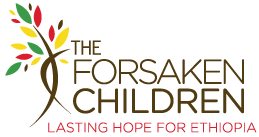What drives The Forsaken Children? The answer to that question is fully clear to The Forsaken Children’s board and to me, but only somewhat clear to the general public.
Personally, I feel scared to share all the nitty-gritty details of what drives me to give my time, energy, and really my life to TFC and the street children of Ethiopia. I worry that people will disagree with me or see TFC’s cause as impossible, insignificant, or heaven forbid – WRONG.
Therefore, I tend to promote the portions of TFC which seem appealing, exciting, and somewhat safe. Things like…
- Rebuilding broken Ethiopian families and keeping existing ones intact (can’t go wrong with that!)
- Running a farm that helps keep rural Ethiopia alive and Onesimus funded (wonderfully put, huh?)
Those are two of our goals, but each one of them have deeper, harder aspects that usually go without mention.
 I am starting to feel compelled to educate people more fully about these harder aspects as they paint a clearer picture of what The Forsaken Children does and believes in. Let me start now by sharing some of our unmentionables (and I don’t mean underwear!)…
I am starting to feel compelled to educate people more fully about these harder aspects as they paint a clearer picture of what The Forsaken Children does and believes in. Let me start now by sharing some of our unmentionables (and I don’t mean underwear!)…
1. Championing the Ethiopian family unit is so important to TFC’s goal for Ethiopia, especially Ethiopian street children. Nice and clean, right?
Actually, many see these poor families’ living conditions and decide them unfit to care for their children. But what happens to the hundreds of thousands of Ethiopian children living within Ethiopia's impoverished reality? Answering this question three years ago helped show me that no matter what the situation is, the BEST answer for the majority of Ethiopia’s children has to be Ethiopian families (be it immediate, extended, foster, or adopted).
I began to understand what Nega meant when in the midst of dirt floors, plastic roofs, filthy clothes, he would say, “this family is strong, they’ll make it!” The heart of a family, its strength and resilience, became clear to me only as the importance of their resources diminished. This was a mental feat hard for this American to make.
2. Keeping rural Ethiopia and its reliance upon agriculture alive drives our focus on the Kota Ganate Agriculture Project. What’s so hard hitting about that one?
While Kota Ganate is all about farmer training and empowerment, it is not about handouts. So often, we foreigners flood Africa with aid. Some of the time, this aid is necessary, but in many instances (and I would lean toward most) it’s becoming a crutch for a continent that really needs to have its crutches kicked out from under it. I believe this is especially true for agriculture.
While we do practice farmer training through Kota Ganate, we aim to end the handouts. In fact, we plan to charge farmers the fare price for the chicks that will be hatched through Kota Ganate’s hatchery starting in 2012. That money will go back into the farm, the community and the ministry working to strengthen Ethiopian families. This way, getting and keeping children off of the streets begins to be done from within Ethiopia and by Ethiopians.
So there you have it, some of The Forsaken Children’s deeper motivation and beliefs. I will try to do my best to share such things with you in the future without shame or discomfort.
What do you think about our views?


